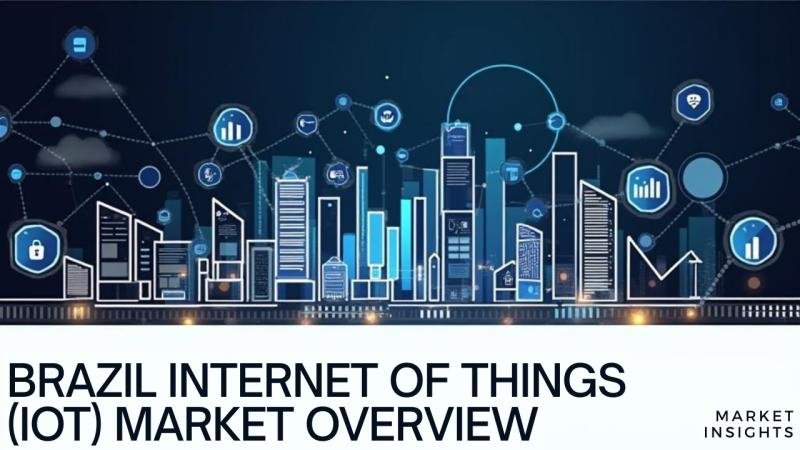Brazil Internet of Things (IoT) Market Overview
Market Size in 2024: USD 18.41 Billion
Market Forecast in 2033: USD 99.34 Billion
Market Growth Rate: 17.8% (2025-2033)
According to the latest report by IMARC Group, the Brazil internet of things (iot) market size was valued at USD 18.41 Billion in 2024. Looking forward, IMARC Group estimates the market to reach USD 99.34 Billion by 2033, exhibiting a CAGR of 17.8% from 2025-2033.
Brazil Internet of Things (IoT) Industry Trends and Drivers:
Expanding Role of IoT in Brazil’s Digital Transformation
The Brazil Internet of Things (IoT) market is continuing to evolve as organizations, governments, and consumers are actively adopting connected technologies to enhance productivity, efficiency, and quality of life. Industries across the country are increasingly relying on IoT-enabled systems to optimize operations, reduce costs, and create new revenue models. Manufacturing companies are implementing connected machinery and predictive maintenance solutions that are improving operational reliability and minimizing downtime.
In agriculture, smart farming technologies are supporting precision crop management, efficient irrigation, and resource optimization, allowing farmers to increase yields while conserving inputs. Healthcare providers are adopting remote monitoring devices and telemedicine platforms that are improving patient outcomes and reducing the burden on traditional medical infrastructure. Meanwhile, urban development authorities are integrating IoT into smart city projects that are enhancing traffic management, waste collection, energy efficiency, and public safety. Consumers are also experiencing transformation through the adoption of smart home devices that are creating safer and more convenient living environments.
These advancements are aligning with Brazil’s growing focus on digital transformation and sustainability, with businesses across multiple sectors embracing connected technologies as enablers of long-term competitiveness. As highlighted in the [Brazil Internet of Things (IoT) Market Size, Share, Trends and Forecast by Component, Application, Vertical, and Region, 2025-2033], the market is expanding strongly on the back of innovation and government support, positioning IoT as a cornerstone of Brazil’s digital economy.
Government Initiatives and Industry Adoption Driving Market Growth
The Brazilian government is actively supporting the IoT market through policies, incentives, and investments that are accelerating digital transformation across industries. National strategies are encouraging enterprises to integrate IoT solutions for improved productivity, sustainability, and global competitiveness. Public sector programs are focusing on expanding digital infrastructure, enhancing connectivity, and ensuring data security, which are collectively enabling IoT adoption at scale.
Partnerships between government bodies, technology providers, and industry leaders are creating collaborative ecosystems that are fostering innovation in areas such as smart energy, logistics, and public services. Companies operating in Brazil are increasingly recognizing IoT as a driver of efficiency, resilience, and business agility, leading to widespread deployment of connected devices across supply chains and operations. Telecom providers are investing in advanced network technologies, including 5G, to deliver high-speed, low-latency connectivity essential for IoT ecosystems.
This improved infrastructure is enabling real-time data collection, analysis, and automation, empowering enterprises to make faster and more informed decisions. Sectors such as automotive and transportation are integrating IoT-enabled solutions for fleet management, predictive analytics, and enhanced customer experiences. Similarly, financial services are leveraging IoT data to develop innovative risk assessment and insurance models, thereby strengthening customer trust and operational efficiency. The convergence of supportive government initiatives with rapid industry adoption is shaping Brazil into a hub for digital innovation, strengthening its global competitiveness and reinforcing its role as a leader in IoT-driven economic development.
Opportunities for Innovation and Sectoral Expansion in IoT
Brazil’s IoT market is continuing to generate significant opportunities for growth, innovation, and cross-sector collaboration. Companies are actively investing in advanced analytics, artificial intelligence, and cloud computing to maximize the potential of connected devices and unlock new business models. In retail, IoT technologies are improving inventory management, enabling personalized shopping experiences, and driving operational efficiency across supply chains.
In energy, smart grid solutions are enhancing reliability, reducing losses, and supporting the integration of renewable energy sources into the national grid. Transportation networks are benefiting from IoT-enabled systems that are improving safety, optimizing routes, and reducing emissions, while logistics providers are leveraging real-time monitoring to strengthen supply chain resilience. The education sector is also adopting connected solutions to enable remote learning, resource optimization, and better student engagement. This wave of adoption is further supported by Brazil’s thriving startup ecosystem, which is developing innovative applications tailored to local challenges and opportunities.
Investors are increasingly recognizing the profitability of IoT-driven ventures, channeling funds into initiatives that combine technology with sustainability, efficiency, and customer-centric approaches. With global demand for connected solutions rising, Brazil is positioning itself as a strategic hub for IoT development, offering both domestic and international stakeholders a promising platform for long-term growth. By aligning innovation with digital transformation strategies, the country is ensuring that IoT adoption continues to expand, creating value across industries while supporting national economic and social progress.
Download sample copy of the Report: https://www.imarcgroup.com/brazil-internet-of-things-(iot)-market/requestsample
Brazil Internet of Things (IoT) Industry Segmentation:
The report has segmented the market into the following categories:
Component Insights:
● Hardware
● Software
● Services
● Connectivity
Application Insights:
● Smart Home
● Smart Wearables
● Smart Cities
● Smart Grid
● IoT Industrial Internet
● IoT Connected Healthcare
● Others
Vertical Insights:
● Healthcare
● Energy
● Public and Services
● Transportation
● Retail
● Individuals
● Others
Regional Insights:
● Southeast
● South
● Northeast
● North
● Central-West
Competitive Landscape:
The competitive landscape of the industry has also been examined along with the profiles of the key players.
Key highlights of the Report:
● Market Performance (2019-2024)
● Market Outlook (2025-2033)
● COVID-19 Impact on the Market
● Porter’s Five Forces Analysis
● Strategic Recommendations
● Historical, Current and Future Market Trends
● Market Drivers and Success Factors
● SWOT Analysis
● Structure of the Market
● Value Chain Analysis
● Comprehensive Mapping of the Competitive Landscape
Note: If you need specific information that is not currently within the scope of the report, we can provide it to you as a part of the customization.
Ask analyst for your customized sample:
https://www.imarcgroup.com/request?type=report&id=28864&flag=C
Contact Us:
IMARC Group
134 N 4th St. Brooklyn, NY 11249, USA
Email: sales@imarcgroup.com
Tel No:(D) +91 120 433 0800
United States: +1-631-791-1145
About Us:
IMARC Group is a global management consulting firm that helps the world’s most ambitious changemakers to create a lasting impact. The company provide a comprehensive suite of market entry and expansion services. IMARC offerings include thorough market assessment, feasibility studies, company incorporation assistance, factory setup support, regulatory approvals and licensing navigation, branding, marketing and sales strategies, competitive landscape and benchmarking analyses, pricing and cost research, and procurement research.
This release was published on openPR.















